Chapter 7 Directors' Duties - alastairhudson.com
Chapter 7 Directors' Duties - alastairhudson.com
Chapter 7 Directors' Duties - alastairhudson.com
You also want an ePaper? Increase the reach of your titles
YUMPU automatically turns print PDFs into web optimized ePapers that Google loves.
factors. The subsection opens with the verb “must” and ends by saying that “in doing so”<br />
regard is to be had to the six factors. Therefore, it is suggested that the verb “must” qualifies<br />
the entire provision and so requires that the six factors are considered, even if the directors<br />
decide that they are not of overriding importance in any given context. This is important<br />
because, if the directors are required to consider these factors, then those factors be<strong>com</strong>e<br />
(arguably for the first time) issues which directors are <strong>com</strong>pelled to consider. Secondly, the<br />
prefatory words in s.172(1) make it clear that these factors should be considered “amongst<br />
other” factors not included on the list. Consequently, the directors may establish what in their<br />
professional judgment is most likely to promote the success of the <strong>com</strong>pany. In that sense, the<br />
legislation encapsulates the principle set out by Jonathan Parker J in Regentcrest Ltd v<br />
Cohen 44 to the effect that the court will not substitute its view of what the directors ought to<br />
have done for what the directors actually did do, because the power and the responsibility<br />
rests with professional directors to make their own decision. What the directors must be able<br />
to do, it is suggested, is to justify the actions they have taken or not taken as being<br />
sufficiently likely to promote the success of the <strong>com</strong>pany at the time. This idea is mirrored in<br />
the opening words of s.172(1) to the effect that “a director of a <strong>com</strong>pany must act in a way<br />
which he considers … would be most likely to promote the success of the <strong>com</strong>pany”:<br />
therefore, each director individually bears a responsibility as well as holding a power (It is<br />
suggested that this chimes in with the requirement that each director exercise independent<br />
judgment (considered below) in that each director has this power and responsibility.) Thirdly,<br />
each director must be acting in good faith in supposing that a given course of action will<br />
promote the success of the <strong>com</strong>pany. Each provision is considered in turn. It should be<br />
recalled that s.172(1) places the benefit of the members as a principal aspect of the success of<br />
the <strong>com</strong>pany, as discussed above.<br />
The six factors<br />
First, it has long been a <strong>com</strong>plaint among radical economists that capitalist markets are<br />
orientated too closely around short-term considerations. In stock markets the key determinant<br />
for much investment activity is the return that is generated on each share by way of dividend<br />
in each financial year. Therefore, to ensure easy access to capital, there is pressure on<br />
management to maximise short-term earnings per share at the expense, it is said, of the longterm<br />
health of the <strong>com</strong>pany and of the economy more broadly. Therefore, the first factor is<br />
“the likely consequences of any decision in the long term”. This chimes in with the concerns<br />
of the Blair-Brown administrations, being social democratic, approximately left-of-centre<br />
governments, to ensure investment for the longer term and the operation of <strong>com</strong>panies for the<br />
longer term benefit of the economy and all involved.<br />
Second, the traditional matrix of English <strong>com</strong>pany law focuses on the rights of the <strong>com</strong>pany,<br />
the rights of the shareholders and the duties of the directors. No-one else had a right to be<br />
considered. In practice, management would consider the need for good industrial relations<br />
44 [2001] 1 B.C.L.C. 80 at 105b. See also Re Smith and Fawcett Ltd [1942] Ch. 304.<br />
14













